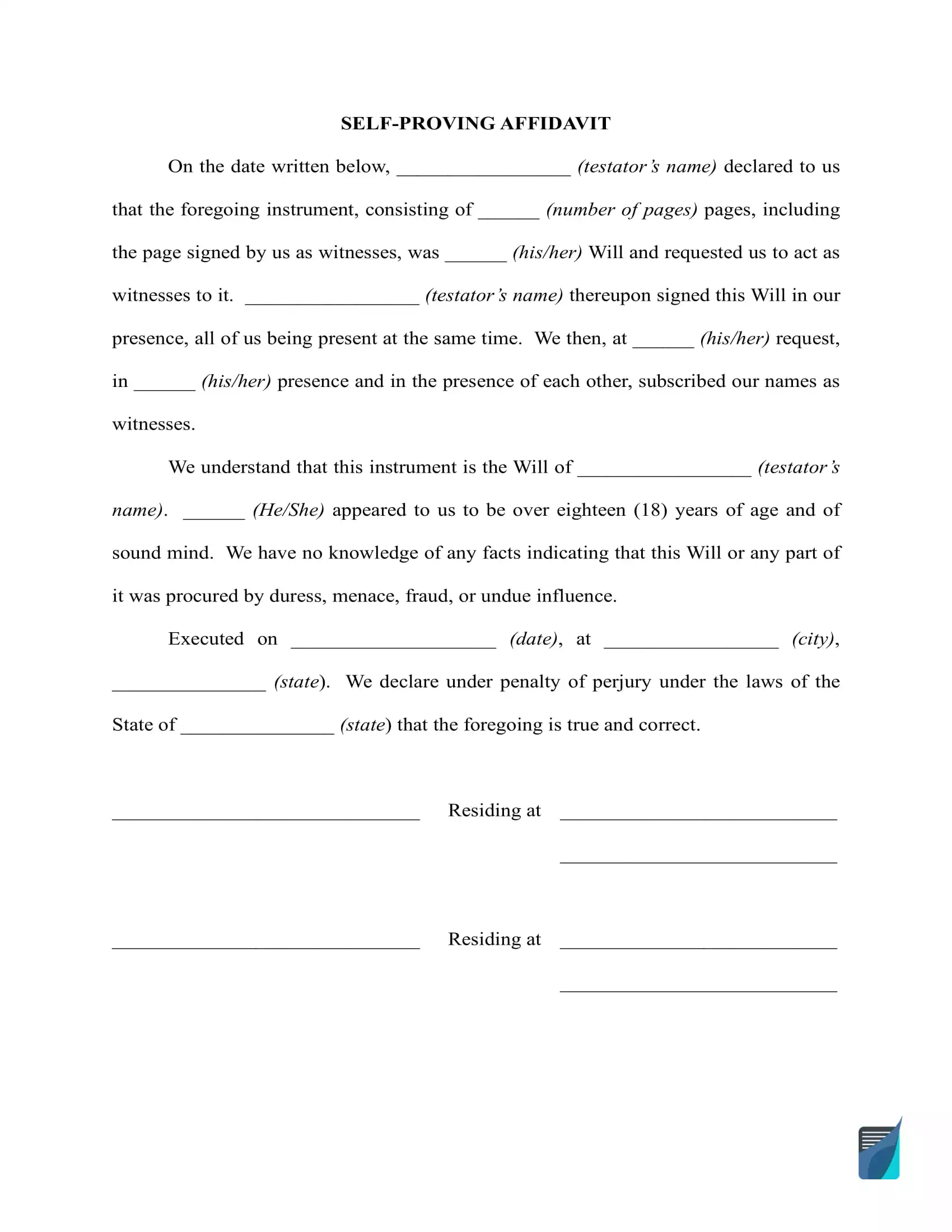
A self-proving affidavit form is necessary for any person who wishes to leave no question as to whether their last will and testament was signed when they were in full mental capacity. This document includes witness accounts given under oath that the testator signed the document and was of sound mind.
Once created, signed, and notarized, the self-proving affidavit is attached to the last will and testament or codicil. This legal instrument makes sure that when the executor of the estate has to oversee the probate process with the court, they have non-disputable proof of the document’s validity.
In most places, state law requires you to create a self-proving affidavit to make it possible for the witnesses not to appear in probate courts. However, in some states like Vermont, you may create a self-proving will with the help of the notary public. In this situation, the will-maker does not need to create an affidavit.
If you need an affidavit sample, you can download one on this site. Need more information on how the self-proving affidavit works and how to use this legal instrument? Keep reading this guide to learn more about that.

Create a free high quality Self-Proving Affidavit online now!
Build Your Document
Answer a few simple questions to make your document in minutes
Save progress and finish on any device, download and print anytime
Your valid, lawyer-approved document is ready
. or download your Self-Proving Affidavit Form as a PDF file or Word file Create a free high quality Self-Proving Affidavit online now! Table of ContentsA self-proving affidavit and attestation clause serve the same purpose. This purpose is to provide the probate court with sufficient evidence of the fact that a person’s last will and testament was signed voluntarily and of sound mind. However, there are some major differences between the two.
The attestation clause is just that, a section of the will. It includes legal language that makes sure the witnessing of this document is done according to state laws. This includes stating that both witnesses are of legal age and do not have a conflict of interest.
However, an attestation clause only helps the will to meet the legal standards set by a state. The probate court will require the witnesses who attested the document to appear in court and testify.
If the witnesses are unable to make it to the court for any reason, the legal process of probate may be delayed. With a self-proving affidavit, that is not a concern.
This legal instrument requires the witnesses of the signing of the will to state under oath that the will was executed properly and attest to the signing. Signing a self-proving affidavit is done in the presence of a notary public and lying while signing the document is considered perjury.
One of the legal ramifications of giving an oath while signing this document is that the probate court does not need to call upon witnesses to administer the testator’s estate. This makes the process faster and more streamlined.
It’s still possible to challenge this document in court if some loved ones have doubts about the witnesses’ testimony.
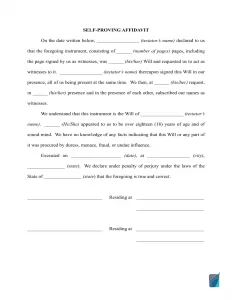
When the testator of the last will dies, the document doesn’t come into effect immediately. It requires some legal action before the estate can be distributed. The first thing that needs to be done is to file the latest will with the probate court.
The court hearing that starts after that and makes sure that the last will meets legal requirements and there is no last will that was signed at a later date. This is why all beneficiaries of the will and the deceased’s heirs are asked to come to the hearing where they have the chance to challenge the will.
Witnesses of the signing of the document are also asked to testify in court to prove the document’s legality. If there is a self-proving affidavit, having witnesses present is not required. This document is given under oath and can act as a substitute for the testimony.
After the probate court proves that the last will meets legal standards, it appoints the executor of the estate. This is mostly done in accordance with the last will itself as normally a testator names a person who can act on their behalf. If that’s not the case, the court will appoint someone on its own, usually a spouse or adult child.
A court may order a person to handle material things of the testator, but ultimately, this requires the executor’s acceptance of the terms of their service. A family member may be safe, but representatives from third parties may have to be financially responsible for their decisions. This is why sometimes executors of estate reject their duties, causing delays to the process.
If the executor of the estate gives their consent to perform estate planning duties, they pay the deceased’s debts, pay their taxes, and distribute the estate according to the last will and testament. When this person is in charge of the estate plan, they have access to the testator’s money and property for the purposes of distributing it. This means that this person has to be reputable in addition to being money-savvy. Failing to pay taxes properly may result in problems down the line.
| STATE | Signing requirements | STATE LAW |
| Alabama | Two Witnesses and Notary Public | Alabama Code, Section 43-8-132 |
| Alaska | Two Witnesses and Notary Public | Alaska Statutes, Section 13.12.504 |
| Arizona | Two Witnesses and Notary Public | Arizona Revised Statutes, Section 14-2504 |
| Arkansas | Two Witnesses and Notary Public | Arkansas Annotated Code, Section 28-25-106 |
| California | One Witness | California Probate Code, Section 8220 |
| Colorado | Two Witnesses and Notary Public | Colorado Revised Statutes, Section 15-11-504 |
| Connecticut | One or more Witnesses and Notary Public | Connecticut Revised Statutes, Chapter 802b, Section 45a-285 |
| Delaware | Two Witnesses and Notary Public | Delaware Code, Title 12, Section 1305 |
| Florida | Two Witnesses and Notary Public | Florida Statutes, Section 732.503 |
| Georgia | Two Witnesses and Notary Public | Georgia Code, Section 53-4-24 |
| Hawaii | Two Witnesses and Notary Public | Hawaii Revised Statutes, Section 560:2-504 |
| Idaho | Two Witnesses and Notary Public | Idaho Statutes, Section 15-2-504 |
| Illinois | Two Witnesses | Illinois Compiled Statutes, Chapter 755, Section 5/6-4 |
| Indiana | Not Required | Indiana Code, Section 29-1-5-3.1 |
| Iowa | Two Witnesses and Notary Public | Iowa Code, Section 633.279 |
| Kansas | Two Witnesses and Notary Public | Kansas Statute, Section 59-606 |
| Kentucky | Two Witnesses and Notary Public | Kentucky Revised Statutes, Section 394.225 |
| Louisiana | Not Permitted | – |
| Maine | Two Witnesses and Notary Public | Maine Probate Code, Title 18-C, Section 2-503 |
| Maryland | Not Permitted | – |
| Massachusetts | Two Witnesses and Notary Public | Massachusetts General Laws, Chapter 190B, Section 2-504 |
| Michigan | Two Witnesses and Notary Public | Michigan Compiled Laws, Section 700.2504 |
| Minnesota | Two Witnesses and Notary Public | Minnesota Statutes, Section 524.2-504 |
| Mississippi | Two Witnesses and Notary Public | Mississippi Annotated Code, Section 91-7-10 |
| Missouri | Two Witnesses and Notary Public | Missouri Revised Statutes, Section 474.337 |
| Montana | Two Witnesses and Notary Public | Montana Annotated Code, Section 72-2-524 |
| Nebraska | Two Witnesses and Notary Public | Nebraska Revised Statutes, Section 30-2329 |
| Nevada | Two Witnesses and Notary Public | Nevada Revised Statutes, Sections 133.050 and 133.055 |
| New Hampshire | Not Required | New Hampshire Revised Statutes, Section 551:2-a |
| New Jersey | Two Witnesses and Notary Public | New Jersey Statutes, Section 3B:3-4 |
| New Mexico | Two Witnesses and Notary Public | New Mexico Annotated Statutes, Section 45-2-504 |
| New York | One or more Witnesses and Notary Public | New York Court Acts, Section 1406 |
| North Carolina | Two Witnesses and Notary Public | North Carolina General Statutes, Section 31-11.6 |
| North Dakota | Two Witnesses and Notary Public | North Dakota Century Code, Section 30.1-08-04 |
| Ohio | Not permitted | – |
| Oklahoma | Two Witnesses and Notary Public | Oklahoma Statutes, Section 84-55 |
| Oregon | One or more Witnesses and Notary Public | Oregon Revised Statutes, Section 113.055 |
| Pennsylvania | Two Witnesses and Notary Public | Pennsylvania Consolidated Statutes, Title 20, Section 3132.1 |
| Rhode Island | One or more Witnesses and Notary Public | Rhode Island General Laws, Section 33-7-26 |
| South Carolina | Two Witnesses and Notary Public | South Carolina Code of Laws, Section 62-2-503 |
| South Dakota | Two Witnesses and Notary Public | South Dakota Codified Laws, Section 29A-2-504 |
| Tennessee | One or more Witnesses and Notary Public | Tennessee Code Annotated, Section 32-2-110 |
| Texas | Two Witnesses and Notary Public | Texas Statutes, Estates Code, Section 251.104 |
| Utah | Two Witnesses and Notary Public | Utah Code, Section 75-2-504 |
| Vermont | Two Witnesses and Notary Public | Vermont Statutes, Title 14, Section 108 |
| Virginia | Two Witnesses and Notary Public | Virginia Code, Section 64.2-452 |
| Washington | One or more Witnesses and Notary Public | Washington Revised Code, Section 11.20.020 |
| West Virginia | One or more Witnesses and Notary Public | West Virginia Code, Section 41-5-15 |
| Wisconsin | Two Witnesses and Notary Public | Wisconsin Statutes and Annotations, Section 853.04 |
| Wyoming | Two Witnesses and Notary Public | Wyoming Statutes, Section 2-6-114 |
Although a self-proving affidavit is not required for a will or codicil to be considered legal, it’s a useful document. It can help streamline the probate process after the testator’s death and leave no questions as to the document’s validity.
Before you sign any documents, make sure to ask your lawyer for legal advice or request a statement from the local authority. This makes sure that your effort is not ruined by not complying with obscure local laws. With that out of the way, here is how you can prepare and write a self-proving will affidavit yourself.
Gather two witnesses

Most local laws in the United States require you to have two witnesses to sign the last will and testament. The first step towards signing an affidavit is to bring the people who witnessed the signing of the will. If the last will is not yet signed, you will need to gather two people to witness the signing and co-sign the affidavit form afterward.
You can’t be a witness if you are:
Schedule a meeting with a notary public

A self-proving affidavit is a sworn statement, and that’s why it requires a notary public to sign the document alongside the witnesses. Find a good notary public in your area and schedule a meeting with them.
Make sure that both witnesses can show up on time. If the last will is already signed, you need to bring the document with you for notarizing the self-proving affidavit.
Note that notary public and attorney are not the same thing. Attorneys represent you before the courts, and notaries take oaths. Attorney-client privilege also doesn’t extend to your communication with the notary public.
Even though your lawyer can’t serve as an oath-taker, you may find a good notary here:
If you or someone you can trust do not have a running relationship with a professional, make sure you check that their track record doesn’t have any problems and that they have plenty of experience. Also, make sure their practice area matches your state and county.
Download a self-proving affidavit form
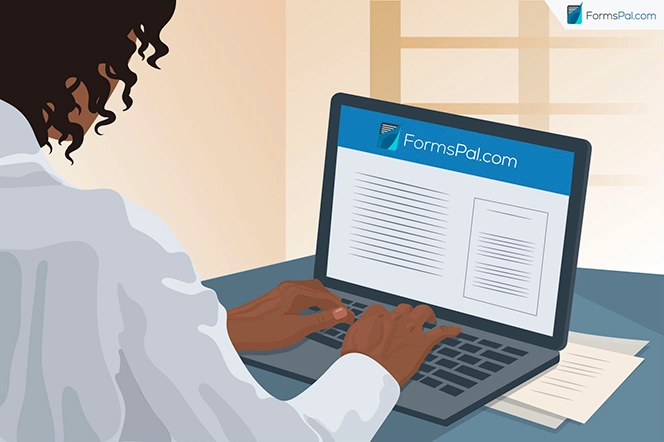
The next step of your journey is to get the right wording on your document. You can ask your notary public for assistance to make sure that the wording meets all of the requirements. However, you don’t need to pay the fee for the creation of the content of the document.
You can just download a self-proving affidavit form for free here on FormsPal. It includes all of the details that make sure that the document does its job well and is completely free. There are several options on the website, so choose the one that serves your purposes better and download a copy.
Fill in the form
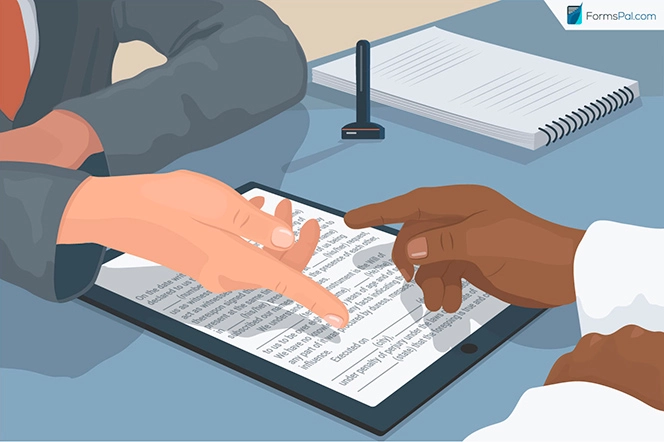
Once you have a valid self-proving affidavit form, fill it out. You must usually do this in the presence of the notary public or together with the witnesses. Make sure to fill in the correct date and double-check the spelling of all the names that you mention in the document.
The document should include:
You don’t need to put a zip code on the document, but you do need to specify your county. Contact information is also optional since you’re mentioning mailing addresses.
Note that a notary cannot be both the witness and notary public for the same document. The notary will provide their name and signature on their own.
Sign the form in the presence of a notary public

Once everything is filled in properly, have the two witnesses sign the document and let the professional notarize it. The notary public will put their name and signature on the affidavit and put their seal on it. From this moment onward, the document is considered to be in power and you can attach it to the will.
With our quick instructions, it will be easy for you to fill out a self-proving affidavit form whenever you need one. But remember that, depending on your state’s laws, you might be required to fill out the document in front of the notary public. Please, check the signing requirements before filling out the form.
Step 1: Identification of the will
In the first paragraph of the self-proving affidavit, you as witnesses should acknowledge that you were asked to be present at the moment of signing the will by the testator. Another thing to specify here is that the testator was present at the moment when you signed the affidavit. You need to fill out the following information:
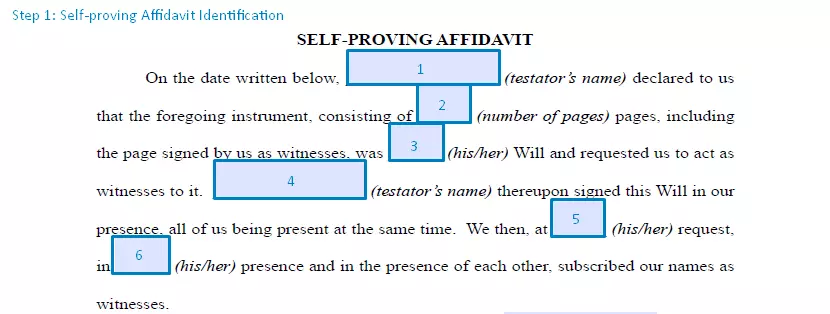
1: The Name of the testator
2: The number of pages in the testator’s will
3: The pronoun used to refer to the testator
4: The Name of the testator, again
5, 6: The testator’s pronoun, again
Step 2: Statements about the testator
In the second paragraph, you need to state that the will is made by the person who appears to be the testator and that they are of sound mind and legal age. It should also indicate that the document was created at the will of the testator without any external influence. You will need to indicate the following:

1: The name of the testator
2: The testator’s pronoun
Step 3: Date and place of execution and witnesses’ oath
In the third paragraph, there should be a declaration under oath about the information on the document being true and correct.

1: Date of the affidavit execution
2: Place where the affidavit is executed
3: The state which governs the affidavit
Step 4: Signatures of witnesses
As the fourth step, put:
1: The name of each of the witnesses
2: The signatures of the witnesses
3: The place of each witness’s residence

Every witness who was involved by the testator should sign the document.
Step 5: Notary acknowledgment

In most states, the document must be acknowledged by a local notary. They should insert some information and add a notary seal to the affidavit. Once this is done, the notary acknowledgment should be attached to the self-proving affidavit. Please, check your state’s laws beforehand.

Mara has been practicing estate planning and trust law in California since 2003, taking pride in helping clients of all backgrounds and asset profiles form a complete and customized estate plan. Her specialties are: estate planning, wills and trusts, trust and probate administration.